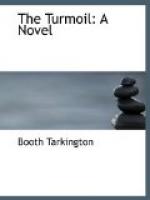No external bubbling contributed to this effervescence; the Sheridans’ table had never borne wine, and, more because of timidity about it than conviction, it bore none now; though “mineral waters” were copiously poured from bottles wrapped, for some reason, in napkins, and proved wholly satisfactory to almost all of the guests. And certainly no wine could have inspired more turbulent good spirits in the host. Not even Bibbs was an alloy in this night’s happiness, for, as Mrs. Sheridan had said, he had “plans for Bibbs”—plans which were going to straighten out some things that had gone wrong.
So he pounded the table and boomed his echoes of old songs, and then, forgetting these, would renew his friendly railleries, or perhaps, turning to Mary Vertrees, who sat near him, round the corner of the table at his right, he would become autobiographical. Gentlemen less naive than he had paid her that tribute, for she was a girl who inspired the autobiographical impulse in every man who met her—it needed but the sight of her.
The dinner seemed, somehow, to center about Mary Vertrees and the jocund host as a play centers about its hero and heroine; they were the rubicund king and the starry princess of this spectacle—they paid court to each other, and everybody paid court to them. Down near the sugar Pump Works, where Bibbs sat, there was audible speculation and admiration. “Wonder who that lady is—makin’ such a hit with the old man.” “Must be some heiress.” “Heiress? Golly, I guess I could stand it to marry rich, then!”
Edith and Sibyl were radiant: at first they had watched Miss Vertrees with an almost haggard anxiety, wondering what disasterous effect Sheridan’s pastoral gaieties—and other things—would have upon her, but she seemed delighted with everything, and with him most of all. She treated him as if he were some delicious, foolish old joke that she understood perfectly, laughing at him almost violently when he bragged—probably his first experience of that kind in his life. It enchanted him.
As he proclaimed to the table, she had “a way with her.” She had, indeed, as Roscoe Sheridan, upon her right, discovered just after the feast began. Since his marriage three years before, no lady had bestowed upon him so protracted a full view of brilliant eyes; and, with the look, his lovely neighbor said—and it was her first speech to him—
“I hope you’re very susceptible, Mr. Sheridan!”
Honest Roscoe was taken aback, and “Why?” was all he managed to say.
She repeated the look deliberately, which was noted, with a mystification equal to his own, by his sister across the table. No one, reflected Edith, could image Mary Vertrees the sort of girl who would “really flirt” with married men—she was obviously the “opposite of all that.” Edith defined her as a “thoroughbred,” a “nice girl”; and the look given to Roscoe was astounding. Roscoe’s wife saw it, too, and she was another whom it puzzled—though not because its recipient was married.




